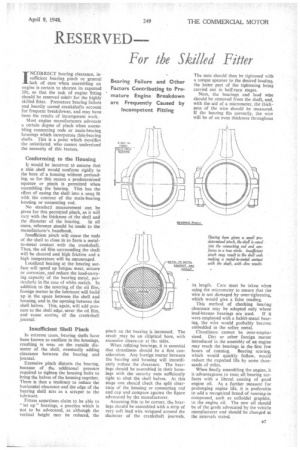RESERVED- For the Skilled Fitter I NCORRECT bearing clearance, insufficient bearing
Page 41

If you've noticed an error in this article please click here to report it so we can fix it.
pinch or general lack of care when assembling an engine is certain to shorten its expected life, so that the task of engine fitting should be reserved solely for the highly skilled fitter. Premature bearing failure and heavily scored crankshafts account for frequent breakdowns, and may have been the results of incompetent work.
Most engine manufacturers advocate a certain degree of pinch when assembling connecting rods or main-bearing housings which incorporate thin-bearing shells. This is a point which mystifies the uninitiated, who cannot understand the necessity of this feature. .
Conforming to the Housing It would be incorrect to assume that a thin shell would conform rigidly to the bore of a housing without preloading, so for this reason a predetermined squeeze or pinch is permitted when assembling the bearing. This has the effect of easing the shell into a snug fit with the contour of the main-bearing housing or connecting rod.
No standard measurement can be given for this permi,tted pinch, as it will vary with the thickness ot the shell and the diameter of the bearing. In all cases, reference should be made to the manufacturer's handbook.
Insufficient pinch will cause the ends of the shell to close in to form a metalto-metal contact with the crankshaft. Thus, the oil film surrounding the shaft will be sheared and high friction and a high temperature will be encouraged.
Localized heating at the bearing surface will speed up fatigue wear, seizure or corrosion, and reduce the load-carrying capacity of the bearing metal, particularly in the case of white meals. In addition to the severing of the oil film, foreign matter in the lubricant will build up in the space between the shell and housing, and in the opening between the shell halves. This, again, will add pressure to the shell edge, sever the oil film, and cause scoring of the crankshaft journal.
Insufficient Shell Pinch In extreme cases. bearing shells have been known to oscillate in the housings, resulting in weat on the outside diameter of the shell, eventually adding clearance between the bearing and journal.
Excessive pinch distorts the bearing, because of the additional pressure required to tighten the housing bolts to bring the halves of the housing together. There is then a tendency to reduce the horizontal clearance and the edge of the bearing shell acts as a scraper to the lubricant..
Fitters sometimes claim to be able to "let op" bearings, a practice which is not to be advocated, as although the vertical height may be reduced, the
pinch on the bearing is increased. The result may be an elliptical bore, with excessi.ve clearance at the sides.
When refitting bearings, it is essential that cleanliness should be a first consideration. Any foreign matter between the bearing and housing will immediately reduce the clearance. The bearings should be assembled in their housings with the security nuts sufficiently tight to abut the shell halves. At this stage one should check the split clearance of the housing or connecting rod and cap and compare against the figure advocated by the manufacturer.
Assuming this to be correct, the bearings should be assembled with a strip of very soft lead wire wrapped around the diameter of the crankshaft journals. The nuts should then be tightened with a torque spanner to the desired loading, the latter part of the tightening being carried out in half-turn stages.
Next, the bearings and lead wire should be removed from the shaft, and, with the aid of a micrometer, the thickness of the wire should be measured. If the bearing fits correctly, the wire will be of an even thickness throughout its length. Care must be taken when using the micrometer to ensure that the wire is not damaged by over-tightening, which would give a false reading.
This method of checking bearing clearance may be adopted only where lead-bronze bearings are used. If it were employed with a babitt-metal bearing, the wire would .probably become embedded in the softer metal.
Cleanliness cannot be over-emphasized. Dirt or othet foreign matter introduced in the assembly of an engine may reach the bearings in the first few hours of running. Rearing scoring, which would quickly follow, would reduce the expected life by some thousands of miles.
When finally assembling the engine, it is advantageous to treat all bearing surfaces with a liberal coating of good engine oil. As a further measure for prolonging engine life, it is preferable to add a recognized brand of running-in compound, such as colloidal graphite, to the engine oil. The new oil should be of the grade advocated by the vehicle manufacturer and should be changed at the intervals stated.




















































































